

Plastic Pollution Coalition. Tesco, Aldi and Carrefour: Stop dumping plastic waste into our oceans! Seabird stomach contents show plastic pollution on the rise. Philadelphia Inquirer, July 22, 2012 Seabird stomach contents show plastic pollution on the rise By Sandy Bauers The northern fulmar, a relative of the albatross that forages for all its food at sea, turns out to be an excellent indicator of marine plastic pollution.
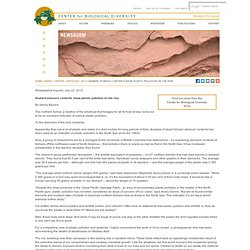
To the detriment of the bird, evidently. Apparently, they eat a lot of plastic and retain it in their bodies for long periods of time. Now, a group of researchers led by a zoologist at the University of British Columbia has determined -- by examining stomach contents of fulmars off the northwest coast of North America -- that pollution there is nearly as bad as that in the North Sea. The research group performed necropsies -- the wildlife equivalent of autopsies -- on 67 northern fulmars that had died ashore or washed ashore. “The average adult northern fulmar weighs 800 grams,” said lead researcher Stephanie Avery-Gomm in a university press release. Well, these birds were dead. Copyright © 2012 Philly.com. Disturbing Video of a Seagull Eating a Plastic Bag. Written by Jaymi Heimbuch If you wonder why plastic bag bans are important, here’s your demonstration.
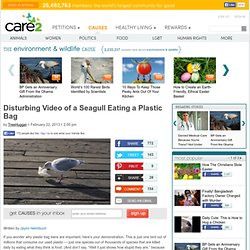
Barnacles are accidentally eating our plastic trash. Barnacles in the Great Pacific Garbage Patch are attaching themselves to trash and eating little plastic particles.
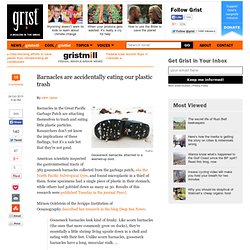
Researchers don’t yet know the implications of these findings, but it’s a safe bet that they’re not good. American scientists inspected the gastrointestinal tracts of 385 gooseneck barnacles collected from the garbage patch, aka the North Pacific Subtropical Gyre, and found microplastic in a third of them. Some specimens had a single piece of plastic in their stomach, while others had gobbled down as many as 30. Results of this research were published Tuesday in the journal PeerJ. A surprisingly pleasant song about plastic pollution. If you’re like the Amazing Mr.
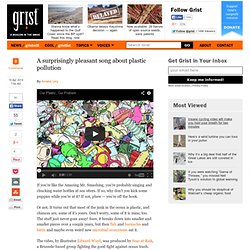
Smashing, you’re probably singing and chucking water bottles at sea otters. If so, why don’t you kick some puppies while you’re at it? If not, phew — you’re off the hook. Or not. Addicted To Plastic 2009 Part 1 of 6. Drowning in Plastic. I’ve been living in Central America the last few months — Costa Rica, for the most part.
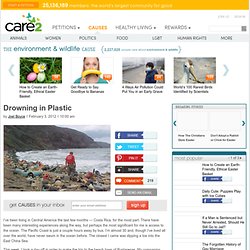
There have been many interesting experiences along the way, but perhaps the most significant for me is access to the ocean. The Pacific Coast is just a couple hours away by bus. I’m almost 30 and, though I’ve lived all over the world, have never swum in the ocean before. The closest I came was dipping a toe into the East China Sea.
This week, I took a day off in order to make the trip to the beach town of Puntarenas. It wasn’t a great initial impression, but we’d traveled a long way to swim, so I shook it off and headed out to the water. After all, we all know plastic isn’t biodegradable, but that doesn’t mean it doesn’t still degrade. Of course, neither one of us could bring ourselves to dunk our head below water and add to our bodies’ plastic counts. Plastics in Our Diet. ShaunFrankson: What does your footprint look ... MIDWAY - Plastic Beach. Look who’s eating your plastic now: A whole unprecedented ecosystem. We already knew that barnacles, lanternfish, and whales have been gobbling up plastic.
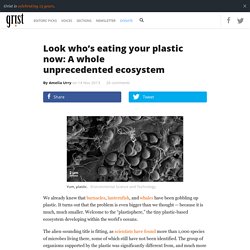
It turns out that the problem is even bigger than we thought — because it is much, much smaller. Welcome to the “plastisphere,” the tiny plastic-based ecosystem developing within the world’s oceans. The alien-sounding title is fitting, as scientists have found more than 1,000 species of microbes living there, some of which still have not been identified. MIDWAY - a film by Chris Jordan. Stop Plastic Pollution From Killing Ocean Animals. The microbeads in your body wash are slowly filling the Great Lakes with plastic. Sigh.
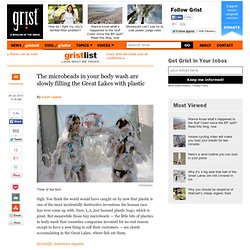
You think the world would have caught on by now that plastic is one of the most incidentally destructive inventions the human race has ever come up with. Sure, L.A. just banned plastic bags, which is great. But meanwhile those tiny microbeads — the little bits of plastics in body wash that cosmetics companies invented for no real reason except to have a new thing to sell their customers — are slowly accumulating in the Great Lakes, where fish eat them. Scientific American reports: They are too tiny for water treatment plants to filter, so they wash down the drain and into the Great Lakes.
I know, I know. Meet Bette Midler With 2 Tickets to Her New Broadway Show, I'll Eat You Last on Friday June 28. Your plastic garbage is killing whales. Whales are eating plastic trash, dying, and washing ashore.
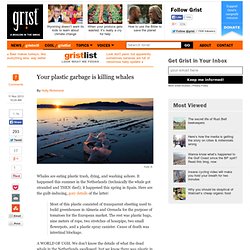
Pharrell Williams presents G-Star RAW for the Oceans. Star RAW - RAW for the Oceans. Pharrell is making jeans out of recycled ocean plastic. Here’s some news to make you happy: Pharrell Williams not only makes catchy, sunny jams, but he’s trying to do something good with all the plastic junk in the Pacific.
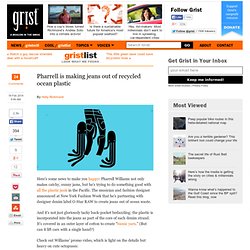
The musician and fashion designer announced at New York Fashion Week that he’s partnering with designer denim label G-Star RAW to create jeans out of ocean waste. And it’s not just gloriously tacky back-pocket bedazzling; the plastic is incorporated into the jeans as part of the core of each denim strand. It’s covered in an outer layer of cotton to create “bionic yarn.” (But can it lift cars with a single hand?) Check out Williams’ promo video, which is light on the details but heavy on cute octopuses: The Ocean Cleanup, developing technologies to extract, prevent and intercept plastic pollution.